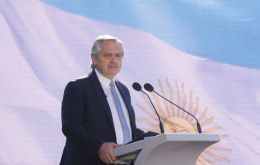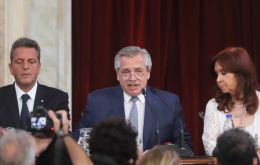MercoPress. South Atlantic News Agency
Tag: IMF
-
Monday, March 14th 2022 - 20:27 UTC
Puebla Group supports Argentina's agreement with the IMF

World leaders gathered under the Puebla Group have expressed their support to Argentine President Alberto Fernández for the deal reached with the International Monetary Fund (IMF) and for its “overwhelming approval in Congress.”
-
Saturday, March 12th 2022 - 09:51 UTC
Demonstrators attack Argentine Congress building during IMF deal debate

While Argentina's Lower House was debating the approval of the refinancing agreement with the International Monetary Fund, demonstrators staged several incidents in and around the Congress building in Buenos Aires.
-
Friday, March 11th 2022 - 21:46 UTC
Argentine Lower House passes IMF deal

Argentina's House of Deputies greenlighted the deal reached between the administration of President Alberto Fernández and the International Monetary Fund in the wee hours of Friday by 202 votes in favor, 37 against, and 13 abstentions.
-
Tuesday, March 8th 2022 - 09:55 UTC
“Nobody is happy with the IMF understanding, we all despise the Fund,” Argentine president

Argentine president Alberto Fernandez admitted “nobody is happy” with the latest understanding reached with the International Monetary Fund, but under no circumstances does it condition the Argentine government economic policy, finally confessing he “despises” the IMF.
-
Tuesday, March 8th 2022 - 09:46 UTC
Ukraine/Russian conflict will have a severe impact on the global economy, anticipates IMF

The International Monetary Fund (IMF) Executive Board addressed the economic impact of the war in Ukraine, price shocks of energy and commodity prices, and on possible fast-tracked financial assistance for affected countries since a severe impact on the global economy can be expected.
-
Thursday, March 3rd 2022 - 09:55 UTC
IMF deal draft due at Argentine Congress Thursday

Argentina's Finance Ministry looked all set Wednesday to send over to Congress the intended deal with the International Monetary Fund (IMF), it was reported. But it was still unclear how things would play out since the ruling Frente de Todos does not have an absolute majority in either House.
-
Thursday, March 3rd 2022 - 09:54 UTC
Financial rescue for embattled Ukraine from IMF and World Bank

The World Bank Group announced on Wednesday that it had stopped all its programs in Russia and Belarus, with immediate effect, as a result of the Russian invasion of Ukraine and hostilities against the people of Ukraine.
-
Wednesday, March 2nd 2022 - 09:55 UTC
Argentine president says IMF deal being fine-tuned

Argentine President Alberto Fernández Tuesday said his country was still fine-tuning details of an agreement with The International Monetary Fund (IMF) regarding the repayment of a US $ 44 bn loan taken during the Mauricio Macri administration.
-
Wednesday, February 23rd 2022 - 09:54 UTC
World Bank support for Argentina in 2022 expected to reach US$ 2bn

A top-level Argentine economic and strategic delegation met in Washington with the World Bank Managing Director of Operations to address close bilateral relations, cooperation, and solid support from the bank for South America's second-largest economy.
-
Saturday, February 19th 2022 - 09:19 UTC
Ahead of another major blunder, an Argentine haircut for the IMF

By Willem H. Buitter – By approving an unprecedentedly large loan to Argentina in mid-2018, despite the country's failure to meet basic borrowing conditions, the International Monetary Fund committed a major blunder. Rather than compounding the mistake with another similar program, it should accept reality – and responsibility.
